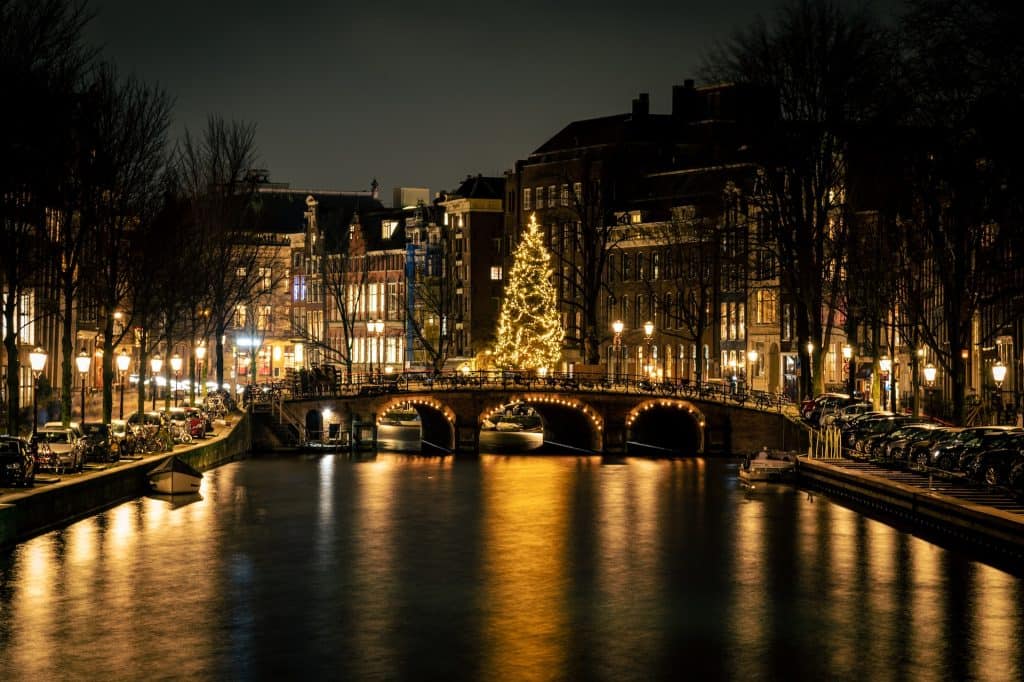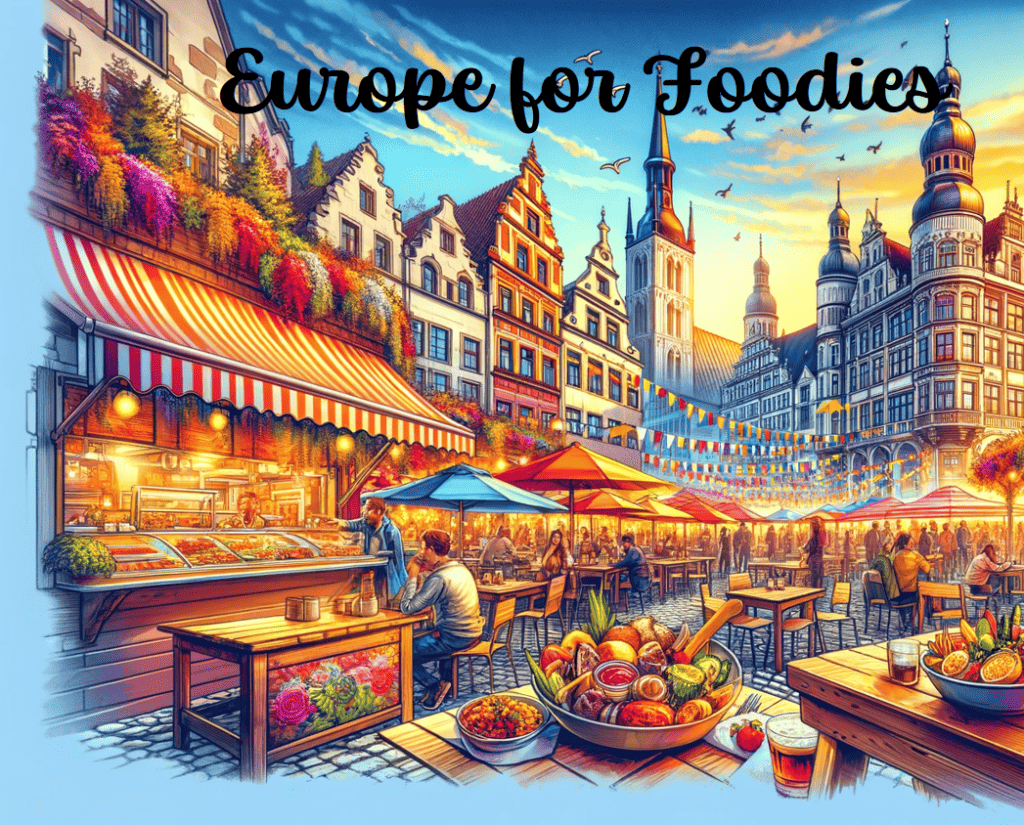In 2024, the continent’s food landscape is as diverse and rich as ever, with cities transforming into epicentres of gastronomic delight.
Exploring the best foodie destinations in Europe is not just about savouring flavours, but also about understanding the cultural and sustainable practices shaping today’s culinary scene.

The Best Foodie Cities in Europe in 2024: My picks…
Athens, Greece: A Timeless Melange of Flavors
Athens, a city where ancient traditions meld seamlessly with modern tastes, offers a captivating experience for food enthusiasts. Here, you can wander through the central markets like Varvakios and Evripidou, discovering fresh produce and culinary treasures.
Greek dishes are known for simple yet profound flavours and Greek cuisine, with its emphasis on fresh ingredients like tomatoes, cucumbers, olives, and feta cheese, presents a feast for the senses in dishes like moussaka, pastitsio, and the world-renowned Greek salad. No visit to Athens is complete without indulging in sweet treats like baklava and loukoumades, which are as much a part of Greek culinary identity as their savoury counterparts.
Lyon, France: The Pinnacle of French Culinary Art
In Lyon, the art of French cooking finds its truest expression. Surrounded by regions rich in dairy produce, the city offers an unparalleled cheese experience, featuring delights such as Saint-Marcellin and St. Nectaire. Lyon’s reputation as the gastronomic capital is not unfounded, with its array of bouchons and Michelin-starred marvels.
The Paul Bocuse Market is a pilgrimage site for any food enthusiast, presenting an array of the finest regional and international produce. The culinary festivals here are a fusion of the senses, marrying music, arts, and gastronomy into a singular, unforgettable experience.
Amsterdam, Netherlands: A Melting Pot of Global Tastes

Amsterdam’s culinary scene is a rich tapestry woven with threads of traditional Dutch flavors and a plethora of international influences. The city’s snack culture, with its iconic bitterballen, kroketten, and stroopwafels, is a testament to its rich culinary heritage.
The influence of Indonesia, a chapter from the Netherlands’ colonial history, brings a unique flavor to the European palate. Beyond these, Amsterdam offers an immersive cheese-tasting journey and picturesque canalside dining, making it a haven for culinary explorers.
Barcelona, Spain: A Tapestry of Catalan Flavors
In the heart of Catalonia, Barcelona stands as a bastion of Spanish gastronomy. The city’s culinary landscape is a blend of traditional Catalan recipes and avant-garde cooking. Walking through the streets of Barcelona, one encounters an array of tapas bars, each offering a taste of local favorites like patatas bravas and gambas al ajillo.
The famed La Boqueria Market is a cornucopia of fresh produce and Catalan specialties, a place where food is not just consumed but celebrated.
Paris, France: A Gastronomic Journey Through the City of Lights
Paris, crowned as Europe’s foodie capital for 2023, continues to enchant food lovers in 2024. From the opulence of Parisian haute cuisine to the simple yet perfect croissants in its bakeries, the city’s culinary landscape is diverse.
The streets of Paris hold as much gastronomic allure as its luxurious dining establishments.
Lisbon, Portugal: A Taste of Tradition and Innovation
Lisbon, with its rich maritime history, offers a unique culinary experience. Portuguese cuisine, with its emphasis on seafood and spices, is both traditional and innovative. Lisbon’s food markets and eateries serve dishes like bacalhau and pastéis de nata, providing a glimpse into the soul of Portuguese cooking.
The city’s less-explored culinary corners are a treasure trove for foodies.
Vienna, Austria: A Melting Pot of Culinary Delights

Vienna, renowned for its imperial history, is also a treasure trove of culinary delights. This city harmoniously blends traditional Austrian cuisine with contemporary culinary innovations. Vienna is famous for its coffee house culture, where you can indulge in a classic Wiener Melange paired with a slice of Sachertorte.
The city’s food markets, like the Naschmarkt, offer a sensory overload with a variety of fresh produce and local specialties.
Rome, Italy: A Gastronomic Odyssey in the Eternal City
Rome, a city as rich in its culinary offerings as it is in history, is a treasure trove for lovers of authentic Italian cuisine. Italian dishes are globally revered, and Rome showcases this with a flair for authenticity and robust flavours. The city’s cuisine is a testament to the art of simplicity, where classic pasta dishes like carbonara and amatriciana shine in their unadorned glory.
The charm of Rome lies in its traditional trattorias and osterias, the heartbeats of Italian food culture. These establishments offer more than just a meal; they provide an authentic Italian dining experience, steeped in generations of culinary tradition.
Berlin, Germany: A Harmonious Blend of Tradition and Modernity
In Berlin, the food scene mirrors the city’s diverse and evolving history. It stands as a melting pot of various cuisines, reflecting its multicultural fabric. Traditional German dishes find their place alongside a burgeoning international culinary scene, catering to a wide array of tastes and dietary preferences.
The city’s iconic dish, currywurst, is a must-try, embodying Berlin’s rich culinary heritage. At the same time, the rising popularity of modern vegan options showcases the city’s progressive and adaptive culinary landscape. Berlin’s food culture is a vibrant tableau, constantly evolving and embracing new trends.
Madrid, Spain: Culinary Fusion of Tradition and Innovation

Madrid, buzzing with energy and life, offers a culinary landscape that perfectly encapsulates the essence of Spanish cooking while embracing modern gastronomic innovation. The city’s vibrant food markets, like Mercado San Miguel, and numerous Michelin-starred restaurants make it a haven for food enthusiasts.
In Madrid, the tapas culture is not merely about the food; it’s a social and cultural tradition, showcasing the Spanish flair for hospitality and culinary excellence. Each tapas bar in Madrid offers a unique window into this rich and flavourful world.
Stockholm, Sweden: A Celebration of Nordic Cuisine
Stockholm, with its stunning landscapes and innovative spirit, is carving a niche in the culinary world. The city offers a unique perspective on Nordic cuisine, emphasizing sustainability, premium ingredients, and minimalist presentation.
Stockholm’s restaurants are adept at turning simple, locally-sourced ingredients into extraordinary culinary creations. From the classic Swedish meatballs to innovative Nordic dishes, Stockholm’s culinary scene is a revelation for food lovers, reflecting Sweden’s deep connection with nature and passion for gastronomy.
Copenhagen, Denmark: The Epicentre of New Nordic Cuisine

Copenhagen has emerged as a leader in the global culinary scene, especially with its interpretation of New Nordic Cuisine. This culinary style is marked by a focus on local, seasonal ingredients and a commitment to sustainability, reflecting Denmark’s profound respect for nature.
Renowned for trailblazing restaurants like Noma, Copenhagen offers a dining experience that seamlessly blends tradition with avant-garde innovation. The city’s food scene is an exploration of the past and future of gastronomy, ensuring each meal is an unforgettable experience.
The Rise of Circular Food Trends in European Gastronomy
Embracing Sustainability and Innovation in Culinary Practices
In 2024, the European culinary scene is not just a haven for gourmets but also a beacon of sustainable and responsible practices. The rise of circular food trends underscores a commitment to eliminating waste and recycling resources. This approach is vividly seen in the use of locally sourced ingredients and innovative recycling methods across restaurants in cities like Barcelona, Paris, and Lisbon.
These practices are instrumental in shaping a more sustainable and eco-friendly culinary culture.
The Emergence of Regenerative Food Practices
European cities are increasingly adopting regenerative food practices, focusing on sustainable agriculture, promoting biodiversity, and reducing environmental impacts. Athens, Lyon, and Amsterdam are at the forefront of this movement, ensuring their culinary offerings are not only delectable but also environmentally conscious.
The Allure of Local Exotics
The concept of local exotics reflects a growing preference for regional foods and the introduction of exotic plants and animals into local agriculture. This trend, particularly notable in Austria and Germany, involves local farmers experimenting with non-traditional crops and livestock, thereby enriching the culinary landscape and offering unique dining experiences.
A Focus on Food Waste Reduction
The trend towards food waste reduction is gaining traction in cities like Vienna, Rome, and Berlin. Restaurants are focusing on using every part of their ingredients, minimizing waste, and supporting local producers. This sustainability-driven shift not only benefits the environment but also enriches the dining experience with fresher, more authentic flavours.
The Impact and Influence of Foodie Tourism
Foodie tourism has evolved into a significant trend, with cities like Vienna, Rome, and Berlin drawing visitors for their culinary attractions. This growing interest has led to an increase in food tours, cooking classes, and gastronomic events, offering visitors immersive experiences into the local food culture.
The Evolution of European Culinary Tourism
European culinary tourism is evolving, extending beyond traditional dining to include food festivals, cooking workshops, and farm-to-table tours. This shift reflects a growing desire among travellers to connect with local cultures through cuisine and understand the origins of their food.
Some final thoughts
This expedition through the diverse flavours and innovative culinary practices of the European food scene in 2024 has been a lot of fun, and boy am I ever off to get something to eat when I’m done. Each city, with its unique blend of tradition, innovation, and sustainability, offers more than just meals; they give you a window into the soul of their cultures and communities.
From the ancient streets of Athens to the vibrant markets of Madrid, the authentic Italian dishes in Rome with their delicious simplicity, to the innovative Nordic cuisine in Stockholm and Copenhagen highlighting the artistry and mindfulness in modern gastronomy, these European cities are good places to start for the foodie traveller.
Keep an eye on the Food and Culinary Travel section of Grown-up Travel Guide which will be expanding even faster than my waistline. Bon Appetit!
